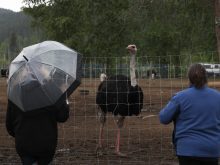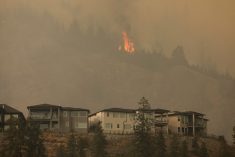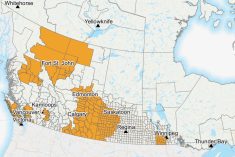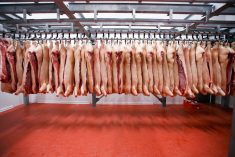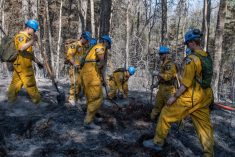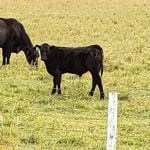British Columbia’s remaining mink farmers are “devastated” by the province’s proposal to phase out their industry over risks related to COVID-19.
The province announced Friday it’s starting the process toward a permanent ban on mink farming — beginning with a ban on mink breeding, followed by a ban on live mink on farms by April 2023 and “all operations ceasing completely” by 2025. All pelts must be sold by that time.
The province cited data from the B.C. Centre for Disease Control, highlighting a concern over the risk of the COVID-19 coronavirus mutating in mink and being passed back to people.
Read Also

Ample supplies and improved livestock sector to boost Canadian feed sector: FCC
Abundant feed grain supplies and improved profitability for the livestock sector should support strong feed demand and sales through the winter, says a new report from Farm Credit Canada.
On top of that risk, the province said, are concerns that any “subsequent mutations” of the virus could spread even more easily and “could have an impact on vaccine effectiveness.”
The province in July slapped a moratorium on any new mink farms in B.C. and capped the number of animals at its current level, effectively limiting purchases of more animals.
That decision, the province said, came after a stretch of time in which two of B.C.’s nine mink farms saw workers test positive for COVID-19, and three saw mink test positive for the virus.
Public health officials have highlighted concerns over allowing the remaining mink farms to continue operating and breeding, including the “ongoing persistence” of infected mink and workers at mink farms contracting COVID-19 from mink — and transmitting the virus on to “broader human populations.”
Furthermore, the province said, officials are mindful of the presence of the “highly transmissible” Delta variant of COVID and the risk of that virus being introduced in mink farms, even from vaccinated people.
Also, the province said, the risk remains that any escapees from a mink farm could transmit COVID-19 to wild animals, which in turn could also pose a threat to public health.
As well, officials pointed out the “challenges” of maintaining strict biosecurity and monitoring “over the longer term” on mink farms.
Public health officials raised their concerns following outreach and discussion with animal health experts and mink producers about “managing the threat of the virus,” the province said.
“This decision follows the recommendations of public health officials and infectious disease experts about managing the threat of the virus for workers at the farms and the broader public,” provincial Ag Minister Lana Popham said Friday in a release.
“Our government will work with affected farmers and workers to help them pursue other farming, business or job opportunities that support their families.”
‘Variant of concern’
The province’s decision doesn’t sit well with the B.C. Mink Producers’ Association, which said Friday it’s “shocked, angered and devastated” by Popham’s announcement.
“We’ve done everything that has been asked of us. We’ve always gone above and beyond to protect our families, farms and the public,” association president Joe Williams said in a separate release.
“We are both mentally and financially exhausted from the political theatre and really wish it would end, so that we go back to providing for our families and supporting our communities.”
Since COVID first turned up on a B.C. mink farm in December last year, the province’s mink farmers have worked to set up “even more intensive biosecurity measures to contain the farm outbreaks, prevent additional outbreaks, protect their animals, and safeguard the health of their families, employees and the public.”
Only one mink farm in the province is currently infected, the association said, and “therefore we will be forced to kill herds of perfectly healthy animals.”
The association said its members seek the “same consideration and respect” granted to other livestock sectors during outbreaks of other zoonotic diseases such as H1N1 and avian flu.
In those cases, the association said, “government did not propose (or even consider) the banning of these sectors… (but) worked with the farmers and supported them in efforts to mitigate risk.”
A separate release Friday from the Canada Mink Breeders Association quotes Wisconsin veterinarian Dr. John Easley, director of research for Fur Commission USA, as saying that while the COVID-19 virus has been detected on mink farms in “many” countries over the past 18 months, “the vast majority of these infections have been self-limiting, and posed very limited risk to the caretakers of the livestock.”
The CMBA also quoted the World Health Organization as saying no “variants of concern” have developed on mink farms.
Viral mutations are often “species-specific” in their pathology, Easley said, which means the COVID virus circulating in the human population — “especially the unvaccinated population” – is at greater risk of producing a “variant of concern.”
“So, if the governmental agencies’ goal is to reduce the risk of a new variant of concern being developed, why haven’t they already mandated that all the citizens be vaccinated?” he said.
“And how are they going to address the risk due to the domestic cat population’s susceptibility to the virus — or all the other animal species (including hamsters, ferrets, and white-tailed deer) that we now know can be infected and reproduce the virus?”
CMBA president Rob Bollert, in the same release, accused the province of surrendering to “pressure tactics” from animal activist groups “rather than basing policy on science and proven good practice.”
B.C. provincial health officer Dr. Bonnie Henry, in the province’s release Friday, said officials have been “monitoring and managing outbreaks related to mink farming… but as this remains an ongoing public health issue, we believe the risk is too great for operations to continue as they were.” — Glacier FarmMedia Network




